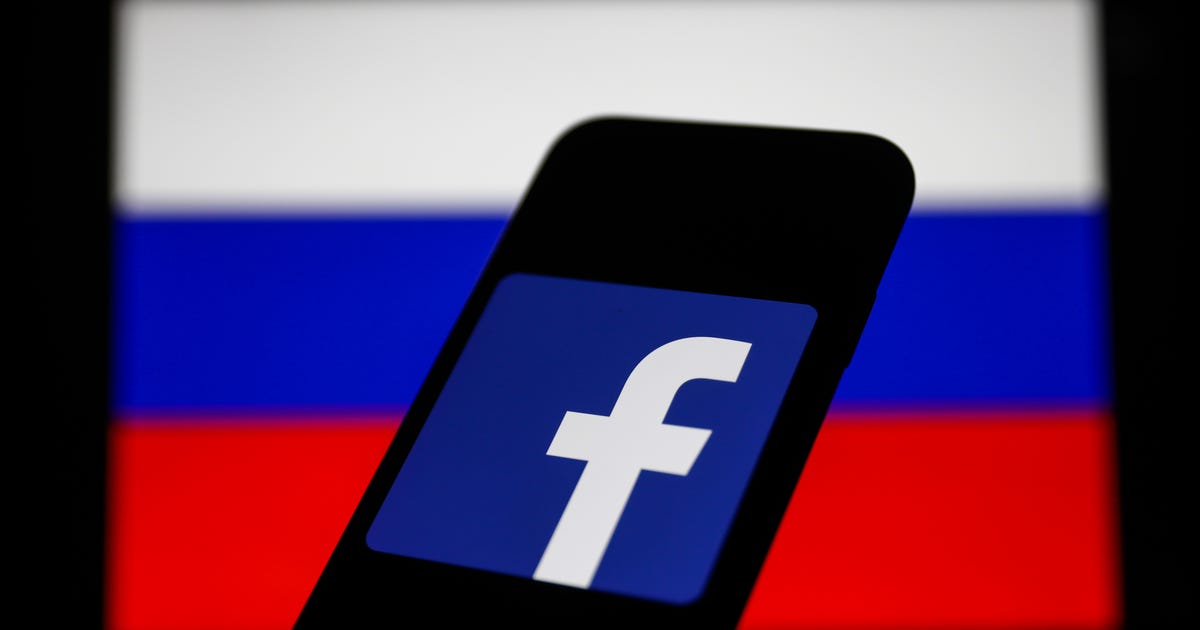Russia says it has blocked Facebook
Photo illustration by Jakub Porzycki/Getty Images
This story is part War in UkraineCNET’s coverage of events there and the wider effects on the world.
Russia’s telecommunications regulator said on Friday it had blocked access to Facebook after the world’s largest social network began making Russian state-controlled media content harder to find on its platform.
The regulator, Roskomnadzor, said in a declaration that he made this decision because the social network would have violated a federal law against the violation of “human rights” and “freedoms” of Russians by restricting its media. Since October 2020, there have been 26 cases of “discrimination” against Russian media by Facebook, the regulator has alleged.
The decision underscores how tensions between the Russian government and tech giants continue to escalate after The Russian invasion of Ukraine.
Facebook has come under more pressure to limit access to Russian state-controlled media over fears these sites spread false claims and propaganda. Last week, Russia said it was partially restricting Facebook access after the social network refused to stop fact-checking and labeling content posted on Facebook by four Russian state media outlets. On Tuesday, Facebook announced new restrictions on Russian media, including downgrading posts globally that contain links to Russian state-controlled media outlets such as RT and Sputnik.
Despite concerns about the spread of misinformation, Facebook has stopped cutting off access to its platforms in Russia. The company says it wants to promote freedom of expression. The social media giant, which rebranded itself at the end of last year as Meta, says Russians are also using its services to protest and show the world what is happening in real time.
“Soon, millions of Russians will find themselves cut off from reliable information, deprived of their daily means of connecting with family and friends and prevented from speaking up,” Meta President of Global Affairs Nick Clegg tweeted on Friday. .
The company said it was doing everything possible to restore services in Russia. He did not say how many people use Facebook in Russia and what it is doing to restore its services.
Meta also owns the photo and video service Instagram and the messaging app WhatsApp. Roskomnadzor does not say whether the blocking affects these apps. Clegg said on Tuesday, ahead of the announcement of a full block, that Russia’s attempt to limit its services had impacted video and other media content, but it was manifesting differently on Facebook and Instagram. “The degradation in service is definitely noticeable,” he said on Tuesday.
Clegg said on that press call that he couldn’t give too many details about how Russia restricted his services because it involves infrastructure in Russia that doesn’t belong to Meta. It’s unclear if Meta still sees an impact on Instagram from Tuesday.
Russia restricts other services
Facebook isn’t the only service Russia is cracking down on. The country reportedly blocked access to several major app stores, Western news outlets and other social media sites.
Interfax News Agency noted On Friday the Russian telecommunications regulator also blocked Twitter. A company spokeswoman, however, said that “we are aware of the reports, but currently do not see anything significantly different from what we had previously share that would indicate a block.” Twitter said on Saturday that the service was restricted for some people in Russia.
Spiegel journalist Mathieu von Rohr tweeted On Thursday, Russia also blocked news agencies BBC and Deutsche Welle, as well as app stores, although it did not say whether this referred to the Apple App Store and Google Play Store.
Latvian news site Meduza said in a blog post that many readers in Russia were unable to access the organization’s website.
Apple, Google, the BBC and Deutsche Welle did not respond to requests for comment.
Read more: Big Tech’s support for Ukraine redefines the industry’s global role
In response to the Russian invasion of Ukraineukrainian minister of technology asked Apple CEO Tim Cook. to block access to the App Store in Russia. The tech giant didn’t go that far when it took action a few days ago, opting instead to remove access to RT News and Sputnik News from the App Store outside of Russia and to stop selling products in Russia. Facebook and YouTube also have restricted access to Russian state-controlled media like RT and Sputnik.
Other tech companies reacted to the invasion by limiting sales in the country to comply with official US sanctions and restricting service. But some have tried to take punitive action without cutting off local access, leading to moves like Snapchat, which has ad sales halted in Russia while keeping the application live in Ukraine, Russia and Belarus as a communication tool.
CNET’s Stephen Shankland explains that blocking access to app stores, Western news sites and social media could encourage a “splinternet” which isolates Russian online interaction with the rest of the world.


Comments are closed.